 1993
1993
Tulane Cancer Center was founded as a matrix center under the direction of Roy S. Weiner, M.D., recruited from the University of Florida
- - - - - - - -
 1994
1994
In January of 1994, Tulane Cancer Center's Stem Cell Transplant Program performs its first transplant. Tulane's program is currently the only source for adult allogeneic stem cell transplants in Louisiana and the only source for adult autologous stem cell transplants in Southeast Louisiana.

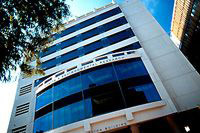 1995
1995
The J. Bennett Johnston Health & Environmental Research Building, a modern cancer biology research facility that houses many of Tulane Cancer Center’s basic science researchers, was built and outfitted.
- - - - - - - -
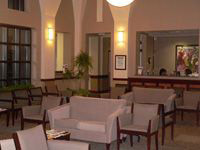 1997
1997
The Tulane Cancer Center Comprehensive Clinic, a state-of-the-art comprehensive multidisciplinary cancer treatment facility within Tulane University Hospital & Clinic, opens its doors.

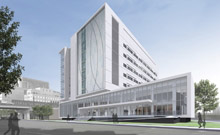 2002
2002
The Louisiana State Legislature creates and funds via an increase in the sales tax on tobacco the Louisiana Cancer Research Consortium, a cancer research partnership between Tulane University Health Sciences Center and Louisiana State University Health Sciences Center, the state’s leading academic medical institutions. The goal of the LCRC is to become a National Cancer Institute-designated cancer center.
- - - - - - - -
 2004
2004
 Prescott Deininger, Ph.D., is awarded a $10.4 million for the Center of Biomedical Research Excellence grant to create a mentoring program to support the research and career development of eight junior faculty in cancer genetics.
Prescott Deininger, Ph.D., is awarded a $10.4 million for the Center of Biomedical Research Excellence grant to create a mentoring program to support the research and career development of eight junior faculty in cancer genetics.

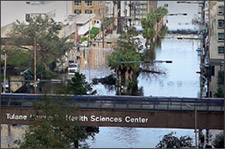 August 29, 2005
August 29, 2005
Hurricane Katrina devastates New Orleans and much of the Gulf Coast, scattering faculty, staff and patients to areas far from home. In the hectic weeks following the storm, Tulane Cancer Center’s major focus shifted to locating, assessing the needs of and returning our faculty and staff to their laboratories, classrooms and offices, and our patients to clinic.
- - - - - - - -
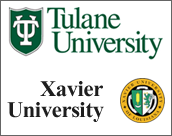 September 2005
September 2005
Tulane University and Xavier University of Louisiana are awarded a $1.4 million P20 planning grant by the National Cancer Institute to establish the Institute for Minority Health and Health Disparity Research and Education to focus on racial disparities in cancer incidence and outcomes.

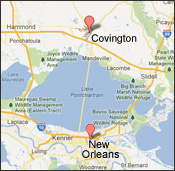 October 2005
October 2005
In an effort to reunite displaced patients with their cancer care team as quickly as possible following Hurricane Katrina, Tulane Cancer Center at Lakeview Regional Medical Center was temporarily opened in Covington, Louisiana, on the North Shore of Lake Pontchartrain.
Tulane Cancer Center researchers begin to return to their laboratories in New Orleans to take inventory of Katrina-related losses while also resurrecting important experiments.
- - - - - - - -
Fall 2005
In an outpouring of support, several organizations, including the National Cancer Institute, the Edmond J. Safra Philanthropic Foundation, and the Leukemia & Lymphoma Society, provide well over $1 million in post-Katrina assistance to help the Tulane Cancer Center rebuild its infrastructure, basic research and clinical programs following the storm.
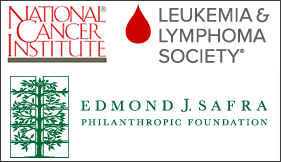

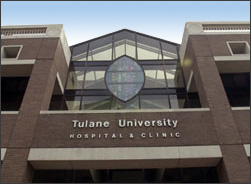 February 14, 2006
February 14, 2006
Tulane University Hospital & Clinic re-opens its doors following Hurricane Katrina and is the first hospital in downtown New Orleans to re-open.
- - - - - - - -
2007
Due to our rich history of strong collaborations and the Consortium’s heavy focus on health disparities issues, Xavier University becomes an associate partner in the Louisiana Cancer Research Consortium.


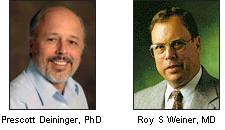 July 2007
July 2007
Prescott Deininger, Ph.D., named interim director of the Tulane Cancer Center and interim-co-director of the Louisiana Cancer Research Consortium, as founding director Roy S. Weiner, M.D., takes on new role as dean of clinical research and training for Tulane University School of Medicine.
- - - - - - - -
 September 2007
September 2007
The Louisiana Cancer Research Consortium's Biospecimen Core Facility performs its first tissue collection. The Core provides LCRC researchers with high-quality samples of normal and diseased human tissues, along with associated clinical data and has amassed over 34,500 aliquot specimens from approximately 600 patients since its first collection.

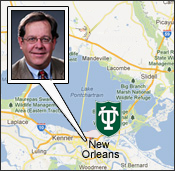 April 2009
April 2009
The focused recruitment of a cadre of gifted basic science researchers in prostate cancer, combined with the arrival of Oliver Sartor, M.D., a world-renowned prostate cancer clinician, creates unprecedented critical mass in translational prostate cancer expertise at Tulane and puts our prostate cancer program on the map.
- - - - - - - -
 July 2009
July 2009
A ceremony held at the site of the Louisiana Cancer Research Center marks the launch of construction of the LCRC’s new state-of-the-art cancer research facility, one of the first major projects in New Orleans’s burgeoning biomedical corridor post-Katrina.

September 2009
Dr. Deininger's COBRE grant renewed through 2014. The five-year, $10.5 million renewal covers research and career development for five new junior investigators. Additionally, Dr. Deininger is awarded an American Recovery and Reinvestment Act grant to cover one additional junior faculty member for two years.
- - - - - - - -
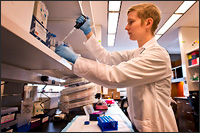 December 2012
December 2012
The Tulane Cancer Center relocated a number of its cancer investigators, their laboratory teams and its administrative unit into the new Louisiana Cancer Research Center, a 10-story, $102 million facility near the Tulane University downtown campus. In all, approximately 100 cancer center personnel will work in the new, state-funded building.
The Louisiana Cancer Research Center is state-of-the-art, featuring an open-lab format, the new standard for modern research facilities that offers several advantages.
